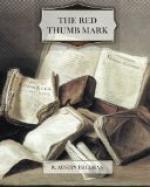“It does certainly look like a hopeless case,” Thorndyke agreed, “and I see no way out of it at present. But I make it a rule, in all cases, to proceed on the strictly classical lines of inductive inquiry—collect facts, make hypotheses, test them and seek for verification. And I always endeavour to keep a perfectly open mind.
“Now, in the present case, assuming, as we must, that the robbery has actually taken place, there are four conceivable hypotheses: (1) that the robbery was committed by Reuben Hornby; (2) that it was committed by Walter Hornby; (3) that it was committed by John Hornby, or (4) that it was committed by some other person or persons.
“The last hypothesis I propose to disregard for the present and confine myself to the examination of the other three.”
“You don’t think it possible that Mr. Hornby could have stolen the diamonds out of his own safe?” I exclaimed.
“I incline at present to no one theory of the matter,” replied Thorndyke. “I merely state the hypotheses. John Hornby had access to the diamonds, therefore it is possible that he stole them.”
“But surely he was responsible to the owners.”
“Not in the absence of gross negligence, which the owners would have difficulty in proving. You see, he was what is called a gratuitous bailee, and in such a case no responsibility for loss lies with the bailee unless there has been gross negligence.”
“But the thumb-mark, my dear fellow!” I exclaimed. “How can you possibly get over that?”
“I don’t know that I can,” answered Thorndyke calmly; “but I see you are taking the same view as the police, who persist in regarding a finger-print as a kind of magical touchstone, a final proof, beyond which inquiry need not go. Now, this is an entire mistake. A finger-print is merely a fact—a very important and significant one, I admit—but still a fact, which, like any other fact, requires to be weighed and measured with reference to its evidential value.”
“And what do you propose to do first?” “I shall first satisfy myself that the suspected thumb-print is identical in character with that of Reuben Hornby—of which, however, I have very little doubt, for the finger-print experts may fairly be trusted in their own speciality.”
“And then?”
“I shall collect fresh facts, in which I look to you for assistance, and, if we have finished breakfast, I may as well induct you into your new duties.”
He rose and rang the bell, and then, fetching from the office four small, paper-covered notebooks, laid them before me on the table.
“One of these books,” said he, “we will devote to data concerning Reuben Hornby. You will find out anything you can—anything, mind, no matter how trivial or apparently irrelevant—in any way connected with him and enter it in this book.” He wrote on the cover “Reuben Hornby” and passed the book to me. “In this second book you will, in like manner, enter anything that you can learn about Walter Hornby, and, in the third book, data concerning John Hornby. As to the fourth book, you will keep that for stray facts connected with the case but not coming under either of the other headings. And now let us look at the product of Polton’s industry.”




